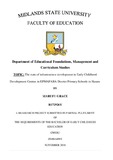Please use this identifier to cite or link to this item:
https://cris.library.msu.ac.zw//handle/11408/3591Full metadata record
| DC Field | Value | Language |
|---|---|---|
| dc.contributor.author | Marufu, Grace | - |
| dc.date.accessioned | 2019-04-30T10:59:36Z | - |
| dc.date.available | 2019-04-30T10:59:36Z | - |
| dc.date.issued | 2018 | - |
| dc.identifier.uri | http://hdl.handle.net/11408/3591 | - |
| dc.description.abstract | The teaching and learning of E.C.D has emerged as a major theme internationally in recent years. Many policies have been made towards the implementation of E.C.D. The government of Zimbabwe also implemented the programme by including E.C.D classes in both public and private schools. It is very critical to ascertain whether the health and safety of learners in terms of infrastructure provision is being considered. It is also very important to find out whether the infrastructure in schools is conducive for E.C.D teaching and learning. The main thrust of this research was to highlight the state of E.C.D infrastructure in primary schools. The targeted population was all primary schools in the EPMAFARA District. A sample of six primary schools, two from each area of the three areas in the district was used in the study. Related literature showed that E.C.D infrastructure has to be built following certain specifications and that many primary schools lack in terms of providing proper E.C.D infrastructure. In addition literature showed that the state of E.C.D infrastructure has a strong bearing on successful teaching and learning. Duration of a building is also said to be affected by how well it is maintained. The study used a mixed method approach of both quantitative and qualitative research methodologies. A descriptive survey was adopted in this study. Information gathered is shown through pictures, tables and figures gathered from questionnaires, interviews and observations. The study revealed that many Primary Schools in EPMAFARA do not have proper E.C.D infrastructure. It was also established that because of economic hardships most primary schools are having difficulties in maintaining the infrastructure they have. Schools need to come up with strategies to raise funds and the government should also intervene. It is hoped that the research findings will act as a wakeup call to administrators on the state of their infrastructure against set standards and ways of minimising challenges faced in provision of infrastructure. Policy makers can also come up with policies which aim at improving infrastructure. Early childhood learners will also benefit should the findings of this research influence some form of change in infrastructure provision and management. | en_US |
| dc.language.iso | en | en_US |
| dc.publisher | Midlands State University | en_US |
| dc.subject | Teaching and learning | en_US |
| dc.subject | Early childhood education | en_US |
| dc.title | The state of infrastructure development in early childhood development centres in EPMAFARA district primary schools in Harare | en_US |
| item.languageiso639-1 | en | - |
| item.fulltext | With Fulltext | - |
| item.grantfulltext | open | - |
| Appears in Collections: | Bachelor of Education in Early Childhood Education | |
Files in This Item:
| File | Description | Size | Format | |
|---|---|---|---|---|
| MIDLANDS STATE UNIVERSITY_Edited.pdf | Full Text | 2.31 MB | Adobe PDF |  View/Open |
Page view(s)
164
checked on Apr 5, 2025
Download(s)
322
checked on Apr 5, 2025
Google ScholarTM
Check
Items in MSUIR are protected by copyright, with all rights reserved, unless otherwise indicated.



